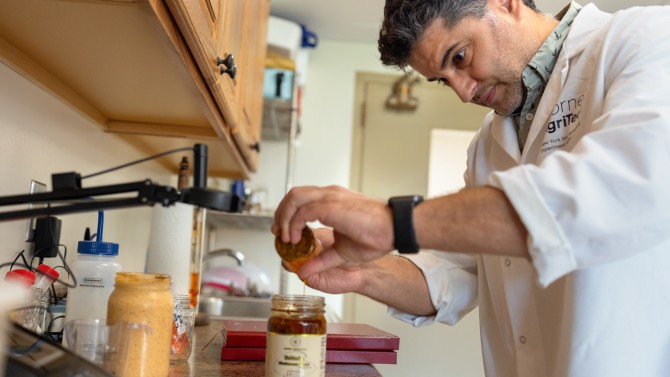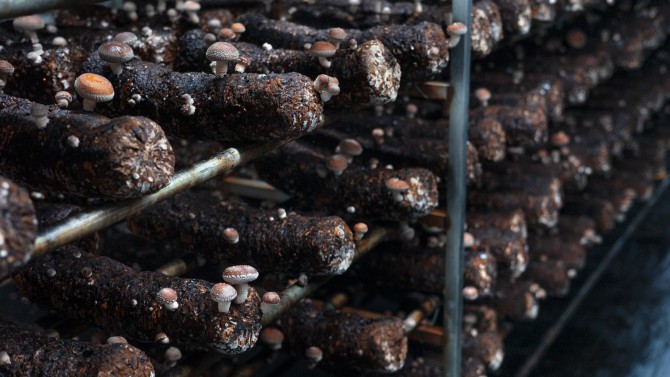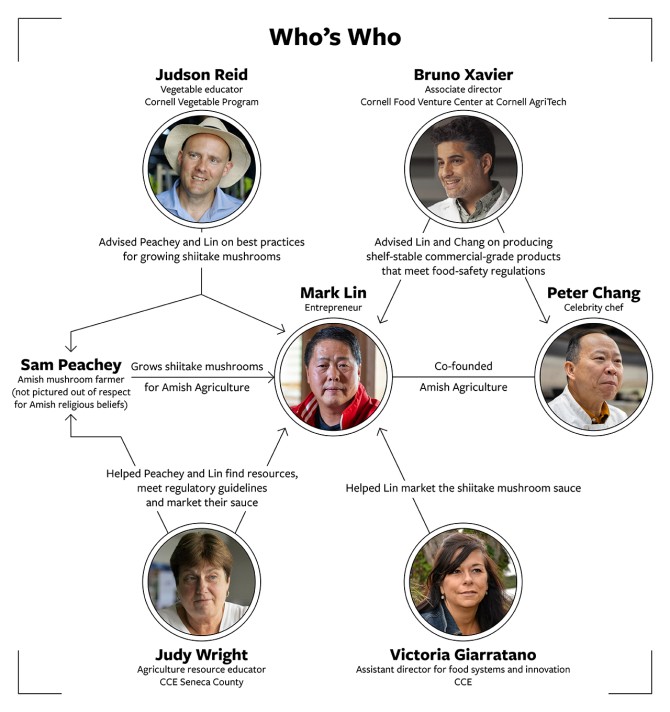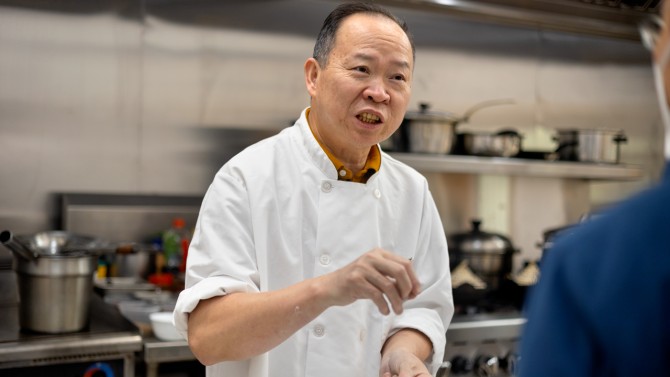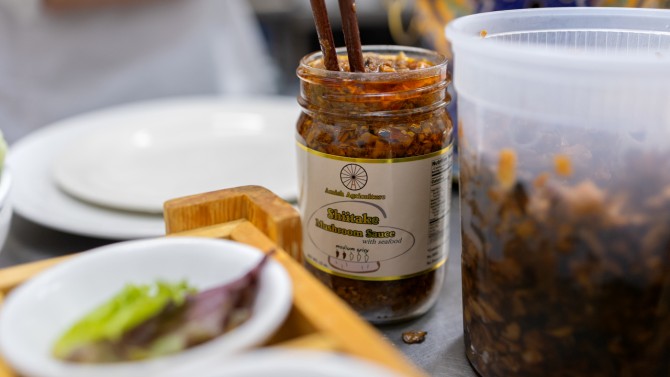With Cornell’s help, an Amish farmer found financial stability growing shiitake mushrooms while an entrepreneur and a chef, both from China, launched a sauce made with the fungi.
In Amish-Chinese partnership, shiitake mushrooms are the main ingredient
By Krishna Ramanujan, Cornell Chronicle
Sam Peachey, who started raising free-range chickens and eggs in 2015, found himself financially strained by 2019.
“I invested a lot in a hen house that didn’t work out so well,” said Peachey, an Amish farmer in Ovid, New York. He had been traveling to New York City each weekend to sell his meat, eggs and produce at farmer’s markets there, but he simply wasn’t drawing enough customers to his stand to make a profit.
“I’m watching a vendor across from me and he has a line of people waiting, and I’m thinking, how can I attract people?” he said.
He then noticed his competitor’s sign: “Fresh Mushrooms.”
“I was firmly resolved when we left that day, that next year, I’m going to have fresh mushrooms,” he said, motivated by his fellow farmer’s obvious success. He asked around and learned that few local farmers grew the mushrooms, which were in demand and fetched a high price at market.
In July 2020, as the COVID-19 pandemic worsened his financial woes, Peachey reached out to one of his regular customers, entrepreneur Mark Lin, who regularly bought chicken, eggs and produce from Peachey when he cooked for his family. Lin liked the Amish food because it was fresh, tender, local and grown using traditional practices, such as horse-drawn plows, which reminded him of his childhood in China.
“He said, ‘Hey Mark, do you know how to grow mushrooms?’” Lin said. Lin was quite familiar with shiitakes because they were grown in his hometown in Zhejiang province, China. As an immigrant, Lin related to Peachey’s farming style and struggles.
“We have a true connection with Amish people,” Lin said, noting both communities’ desire to sustain their cultures and practices. “They’re a minority group, and slowly their farming techniques may just fade away because of technology and progress.”
The conversation inspired a partnership between Peachey, Lin and Lin’s friend Peter Chang, a Chinese chef who won the James Beard Award in 2016 for best chef in the mid-Atlantic region and owns 14 restaurants in the Washington, D.C. area, Virginia and in Stamford, Connecticut. The collaboration, which centers around mushrooms, was borne out of the COVID-19 pandemic that reshaped all of their businesses. It is rooted in each man’s commitment to simple, largely bygone small-farm lifestyles, which they had each experienced in their own ways. And it was enabled by their relationships with experts at Cornell.
As their plans took shape, both Lin and Peachey sought help from Cornell Cooperative Extension (CCE) specialists they’d consulted in the past. CCE staff had advised Lin on his attempt to grow tea for the Finger Lakes Tea Company he started in Waterloo, in Seneca County. And Peachey already knew Judson Reid ’97, a vegetable educator at the Cornell Vegetable Program, who helped develop the Seneca Produce Auction in Romulus, New York, where Peachey served as auctioneer.
With Cornell’s help, Peachey found financial stability growing shiitake mushrooms, while Lin and Chang launched a business featuring a mushroom sauce – at once an ingredient for dishes, a condiment and a dressing – made from Peachey’s shiitakes.
With staff from Cornell Cooperative Extension helping Peachey with best management practices for growing shiitakes and developing a plan for food safety, and Cornell AgriTech professionals advising Lin and Chang on how to get their sauce to market, the sauce has now made its way to the shelves of three Taste NY stores run by CCE around the state, with applications in for more.
“It’s a fascinating cross-pollination between these two different cultures,” Reid said.
Mushroom magic
Lin connected Peachey to a shiitake farmer in Albany, where Peachey bought shiitakes for resale at GrowNYC Greenmarkets, with whom Cornell partners. Peachey’s hunch was correct: The mushrooms drew more regular customers to his booth.
Emboldened by this success, and with Lin’s financial support, Peachey then built two large greenhouses – roughly 28 by 160 feet – on his farm in late 2020. He fitted the greenhouses with long racks and sprinklers and found logs to inoculate with shiitake spores.
Peachey contacted Reid for advice. “I told him I needed all the help I could get because I didn’t know enough about mushrooms,” Peachey said.
Reid and colleagues helped Peachey develop a Good Agricultural Practice food safety plan, which he needed to produce and sell mushrooms commercially. Peachey’s family and others were trained to adhere to the plan.
“We needed to ensure that the mushrooms were grown safely,” Reid said, “and that they left here safely.”
Following his faith’s traditions, Peachey faced unique challenges that might otherwise have been solved by technology like thermostats and climate controls. He built his greenhouses on a 3% grade – an Amish design – to take advantage of the thermodynamics of rising heat, creating a natural air flow from one end of the long structures to the other. In winter, when temperatures drop to 10 degrees outside, an indoor wood stove keeps the greenhouse air at 70 degrees.
The greenhouse construction had the added benefit of enabling year-round growing conditions, positioning Peachey for success during the off-season.
“In the wintertime there’s not a lot of produce being grown,” noted Judy Wright, a CCE Seneca County agricultural resource educator who assisted Lin and Peachey. “So, the mushrooms offered a good opportunity to grow something through the winter that could be sold for income.”
Peachey picked the first shiitakes in early February 2021. Mark and his brother, Leo Lin, immediately began selling the mushrooms at local grocery stores and in Chinese supermarkets in Boston and New York City.
The shift to shiitakes reinvigorated Peachey’s business. “Mushrooms have changed our lives,” Peachey said. “My goal is to be known as the mushroom man. It’s not just financial, it’s also a passion: to try and grow something healthy that people love.”
Celebrity chef
By summer 2021, Peachey – with help from Cornell partners Wright and Reid – needed to balance three basic conditions for growing shiitakes: the correct temperature, humidity and amount of water. Achieving each condition was exponentially more challenging without modern thermostats and climate control. In July 2021, a rise in heat caused an entire greenhouse of mushrooms – thousands of pounds of fungi – to bloom at once. This excess supply presented a new challenge, since shiitakes remain fresh only a few weeks at most.
When Chang learned of the wasted shiitake crop, he didn’t want Peachey to lose revenue, and he and Lin agreed to absorb the losses. Chang and Lin had already started a business, Amish Agriculture, Inc., which aimed to help distribute Amish produce, meat and eggs. They added mushrooms to their product line. Today, 15% of the ingredients that Chang uses in his restaurants – mushrooms, chickens, ducks, eggs, and garlic scapes and bulbs – come from Amish farms. Peachey grows the mushrooms, and Mark and Leo Lin deliver them to Chang’s restaurants.
“I respect the Amish a lot, that they persevered in a hard time and were able to continue farming,” said Chang, who hails from a rural farming community in China’s Hubei province. “Looking at Amish children reminds me of growing up in the rural area in China. My heart is to help them.”
At the same time, Lin realized the pandemic was changing his business goals. Before, his dream was to have a personal brand that spread across the U.S. More recently, he just wants to help people.
It was then that Chang came up with the idea of creating a sauce that could be made from extra shiitakes, including edible but blemished mushrooms that didn’t meet store standards. So, he developed a sauce made mostly from finely diced shiitakes, chili oil to bring out the flavor, and dried shrimp and scallops.
Chang slowly introduced the sauce in his restaurants to test customer reaction and tweak the recipe. He ultimately created six versions of mushroom sauce, including one with beef and another with seafood.
Chang is proud of the response. “Not only Chinese,” he said, “but American customers like it as well.”
Into jars
After the success in the restaurants, Lin and Chang decided to try to sell the Amish Agriculture mushroom sauce in stores. For guidance, they turned to Bruno Xavier, Ph.D. ’08, associate director of the Cornell Food Venture Center at Cornell AgriTech in Geneva, New York. The center helps about 500 food entrepreneurs a year commercialize their products, assisting with lab analysis, regulatory compliance, nutritional analysis and packaging.
“We’re very lucky and happy to get help from Cornell,” Chang said, “because from the perspective of food safety, we are not very knowledgeable and we need support.”
Led by Xavier, the Food Venture Center staff tested the samples, evaluated ingredients and provided options for making the product safe and shelf-stable. They also helped scale up the recipe. And they made it possible for Lin and Chang to shorten the time and lower the cost of making products safe and shelf-stable without losing nutritional value and taste.
“There’s a lot of learning that goes into that, even for an experienced chef like Peter,” Xavier said. “It’s one thing to serve the food in your restaurant, and it’s going to be immediately consumed. But if you are going to put that in a jar, and ship it all over the country, you have completely different concerns and parameters that you have to meet.”
Xavier quickly noted two serious challenges to scaling the mushroom sauce. The oil base made it hard to lower the pH to keep the sauce acidic enough to ward off microbial growth. And the oil lubricated the jar seal, creating difficulties in securing the lids.
Xavier lowered the pH as much as possible to limit microbial growth so that they could increase the water in the product, creating a better vacuum in the container.
When the recipe was ready and the process was approved by state regulators, Lin took his sauce to Craft Cannery, a co-packer near Rochester. The cannery’s owner has his own Cornell connection, having developed tomato sauces through the Food Venture Center and Cornell’s Center of Excellence for Food and Agriculture, which helps food product and agricultural technology companies launch, grow or relocate to New York state.
The first jars of Amish Agriculture shiitake mushroom sauce were filled in April 2023.
Off the shelf
Peachey says his finances are back on track thanks to selling shiitakes. He and Lin have also tried to teach other Amish farmers to boost their incomes by growing mushrooms. They have conducted workshops over the last few years at Peachey’s farm and in Wisconsin and Ohio.
CCE’s Judy Wright helped Lin apply to sell the sauce at Taste NY Welcome Center stores in Broome County and Auburn. The sauce will soon be available for sale online. Response has been positive, especially after Lin and Peachey offered in-person samples in June.
“As soon as people tried samples, the two cases Mark brought were off the shelf,” said VictoriaGiarratano, assistant director for food systems and innovation at CCE.
“One of my co-workers saw Mark the other day and was asking where she could buy another jar because her family went through it like that,” Wright added. “People like it.”
Media Contact
Get Cornell news delivered right to your inbox.
Subscribe